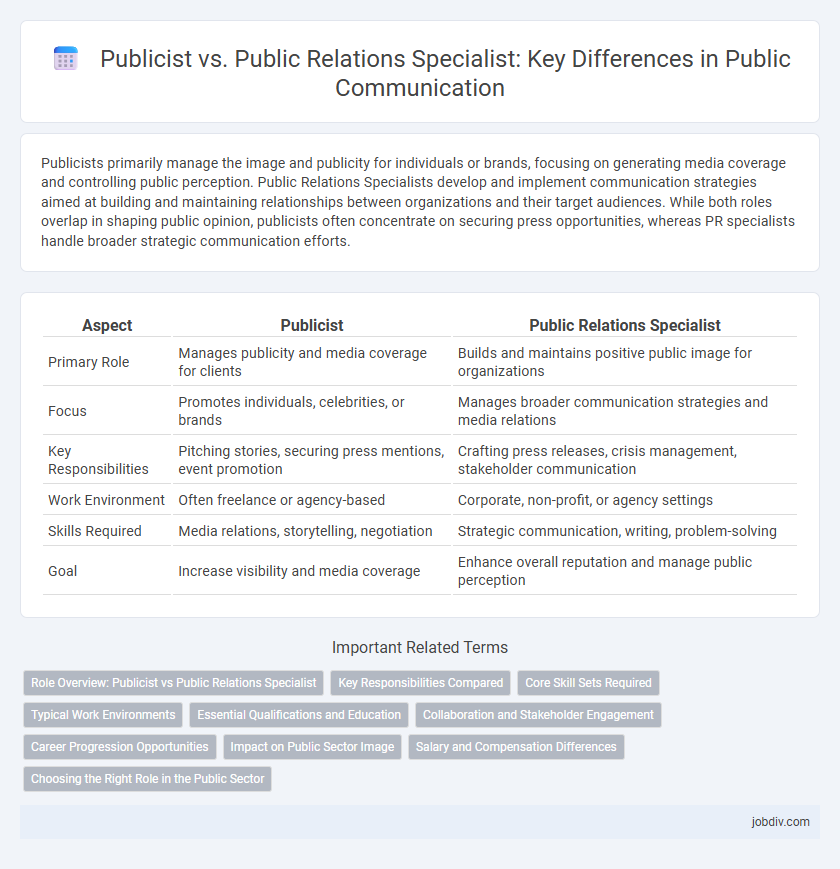Publicists primarily manage the image and publicity for individuals or brands, focusing on generating media coverage and controlling public perception. Public Relations Specialists develop and implement communication strategies aimed at building and maintaining relationships between organizations and their target audiences. While both roles overlap in shaping public opinion, publicists often concentrate on securing press opportunities, whereas PR specialists handle broader strategic communication efforts.
Table of Comparison
| Aspect | Publicist | Public Relations Specialist |
|---|---|---|
| Primary Role | Manages publicity and media coverage for clients | Builds and maintains positive public image for organizations |
| Focus | Promotes individuals, celebrities, or brands | Manages broader communication strategies and media relations |
| Key Responsibilities | Pitching stories, securing press mentions, event promotion | Crafting press releases, crisis management, stakeholder communication |
| Work Environment | Often freelance or agency-based | Corporate, non-profit, or agency settings |
| Skills Required | Media relations, storytelling, negotiation | Strategic communication, writing, problem-solving |
| Goal | Increase visibility and media coverage | Enhance overall reputation and manage public perception |
Role Overview: Publicist vs Public Relations Specialist
A Publicist primarily focuses on generating media coverage and managing the public image of clients through press releases, events, and direct media outreach. A Public Relations Specialist develops and implements broader communication strategies, including crisis management, internal communications, and brand reputation across multiple platforms. Both roles require strong media relations skills, but Publicists concentrate more on publicity efforts, while Public Relations Specialists handle comprehensive community and stakeholder engagement.
Key Responsibilities Compared
Publicists primarily focus on managing and promoting the public image of clients through media coverage, press releases, and securing interviews, often working closely with journalists to generate positive publicity. Public Relations Specialists handle broader strategic communication efforts, including crafting communication plans, managing crises, organizing events, and maintaining relationships with various stakeholders to enhance an organization's overall reputation. Both roles require strong communication skills, but Publicists are more media-centric while PR Specialists oversee comprehensive brand messaging and reputation management.
Core Skill Sets Required
Publicists excel in media relations, content creation, and brand promotion, focusing on securing press coverage and managing public perception through storytelling and strategic messaging. Public Relations Specialists possess strong skills in communication strategy, crisis management, and stakeholder engagement, ensuring consistent messaging across channels and maintaining positive organizational reputation. Both roles require expertise in social media management, audience analysis, and writing, but publicists prioritize media outreach while PR specialists emphasize comprehensive reputation management.
Typical Work Environments
Publicists typically work in advertising agencies, corporate marketing departments, or entertainment industries where managing media coverage and promoting clients is essential. Public relations specialists are often employed by nonprofit organizations, government agencies, or large corporations, focusing on crafting communication strategies and maintaining the client's public image. Both roles frequently require collaboration across multiple platforms, but publicists tend to operate in fast-paced, media-centric environments while PR specialists engage more in strategic planning and community relations.
Essential Qualifications and Education
Publicists typically need a bachelor's degree in communications, journalism, or public relations, with strong skills in media relations and strategic messaging. Public Relations Specialists also require a bachelor's degree, often in public relations, marketing, or communications, emphasizing expertise in managing public perceptions and brand reputation. Both roles benefit from experience in social media management, writing, and campaign development to effectively promote clients and organizations.
Collaboration and Stakeholder Engagement
Publicists and public relations specialists collaborate closely to enhance brand visibility and manage stakeholder relationships effectively. Publicists focus on securing media coverage and crafting compelling narratives, while public relations specialists develop strategic communication plans that engage diverse stakeholders, including customers, investors, and community members. Their combined efforts ensure cohesive messaging and build lasting trust across multiple platforms and audiences.
Career Progression Opportunities
Publicists often begin their careers managing individual client publicity before advancing to senior roles overseeing multiple campaigns, while public relations specialists typically move from entry-level PR assistant positions to managerial roles coordinating broader communication strategies. Career progression for publicists may lead to becoming a director of publicity or talent relations, focusing on media exposure for high-profile clients. Public relations specialists can evolve into PR directors or communication managers, shaping organizational messaging and managing corporate reputation on a larger scale.
Impact on Public Sector Image
Publicists primarily enhance the visibility of individuals or brands through targeted media exposure, which can indirectly influence public perception of public sector entities. Public Relations Specialists in the public sector develop strategic communication plans to build trust, manage crises, and promote transparency, directly affecting the organization's reputation and public confidence. Their roles are complementary, but PR specialists have a more significant impact on maintaining and improving the public sector image through sustained stakeholder engagement and message consistency.
Salary and Compensation Differences
Publicists typically earn an average salary ranging from $45,000 to $75,000 annually, with variations based on experience and industry, while Public Relations Specialists often have a broader pay scale, averaging between $50,000 and $90,000 per year due to diverse responsibilities. Compensation for Public Relations Specialists may include bonuses and performance incentives tied to campaign success, exceeding standard publicist earnings in corporate or agency settings. Salary differences are influenced by factors such as job scope, expertise in media relations, and the size of the employing organization.
Choosing the Right Role in the Public Sector
Publicists primarily focus on managing the image and media coverage of individuals or brands, making them ideal for targeted publicity campaigns in the public sector. Public Relations Specialists develop broader communication strategies, handle stakeholder engagement, and manage public perception for government agencies or nonprofit organizations. Choosing the right role depends on whether the objective is concentrated media promotion or comprehensive public communication management within the public sector.
Publicist vs Public Relations Specialist Infographic

 jobdiv.com
jobdiv.com